Gender Equality and Diversity
Women's Centre KHANZAD Sulaimania - 29 years against violence against women and for gender equality!
KHANZAD was founded in 1996 as the first non-partisan women’s centre in Sulaimania. In the early years, the focus was on education and networking for women; at the end of the 1990s, KHANZAD – together with other women’s projects and activists – played an active role in the public discussion of gender-specific violence. Much has been achieved since then.
Table of Conents
Our
Partner Organisation: KHANZAD - Social and Cultural Centre for Women in Sulaimania
In 1996, the social and cultural women’s centre KHANZAD was founded as the first politically independent women’s centre in Sulaimania. In the early years, the focus was on education and networking for women; at the end of the 1990s, KHANZAD – together with other women’s projects and activists – played an active role in the public discussion of gender-specific violence. Much has been achieved since then. In 2009, a civil law reform in the Kurdistan Region strengthened women’s rights in divorce, custody and inheritance law. The family law passed in 2011 criminalises violence against women and female genital mutilation. The Kurdistan Regional Government runs shelters for women at risk of violence and – via the Directorate for Combating Violence against Women (DCVAW) – contact points that combine counselling for women with police prosecution of perpetrators. However, the existing refuge and protection options as well as the information and counselling services are still inadequate and the implementation of legal reforms is hindered by strong religious and traditional parallel structures and patriarchal norms, particularly in the family sphere. It is still difficult for women to develop a life perspective without a male provider.
Forced marriages, domestic violence and female genital mutilation are still widespread, especially in rural areas. Women and girls who violate the code of honour and are discovered in premarital or extramarital relationships, for example, are punished and are often threatened with honour killings.
The ongoing political, economic and humanitarian crisis in the Kurdish Region since the advance of the IS terrorist militia in 2014 has pushed the issue of women’s rights off the political agenda. Local women’s organisations are concerned about the rise of fundamentalist discourse, which is once again restricting reforms, rights and mobility that have already been fought for.
Guidelines for the Work of KHANZAD
KHANZAD works with women and men from different ethnic and religious groups in Iraq, with refugees AND host communities, with survivors of current AND past violent conflicts – promoting mutual understanding and dialogue.
KHANZAD advocates a holistic, resource- and empowerment-oriented counselling approach that combines psychosocial, legal and medical counselling with vocational training and education, KHANZAD has developed specific, locally contextualised women-centred family mediation strategies to support women and resolve violent conflicts within the family.
KHANZAD represents a transformative concept of gender, involves men in its counselling and educational work, sensitises them to women’s rights, encourages them to reflect on male concepts of honour and roles and to address their own experiences of violence.
KHANZAD promotes cooperation between civil society and the state to strengthen sustainable local structures and combines counselling for women with training for local experts and lobbying for legal and political reforms.
Case supervision, team strengthening and the creation of spaces for self-reflection and self-care for employees and cooperation partners are important components of all projects.
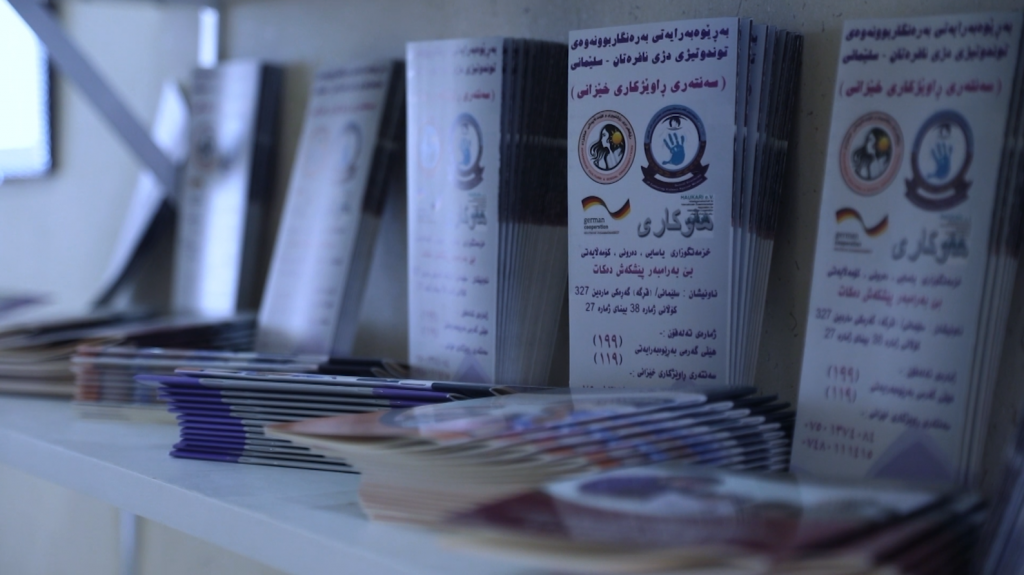
KHANZAD's Continuous Activities
At the KHANZAD Women’s Centre, a team of social workers and lawyers advises women in family conflict situations, women affected by physical and psychological violence, stigmatisation, social ostracism or at risk of honour killings. KHANZAD represents the women as lawyers, refers them to protection structures or engages in family mediation processes, often lasting months, to ensure the women’s safety and their return to their social contexts.
KHANZAD has been supporting women in the remand and penal prisons of Sulaimania since 1999. Many of the women are imprisoned for adultery and prostitution and are at risk of stigmatisation and violence. KHANZAD provides psychosocial and legal advice to imprisoned women and organises educational courses. KHANZAD also organises training courses for social workers and security staff in prisons and is committed to reforms in the prison system.
Together with other women’s and human rights groups, KHANZAD is involved in campaigns against gender-based violence, for the consistent prosecution of perpetrators, for the implementation and improvement of the family law passed in 2011 and for the self-determination and political participation of women.
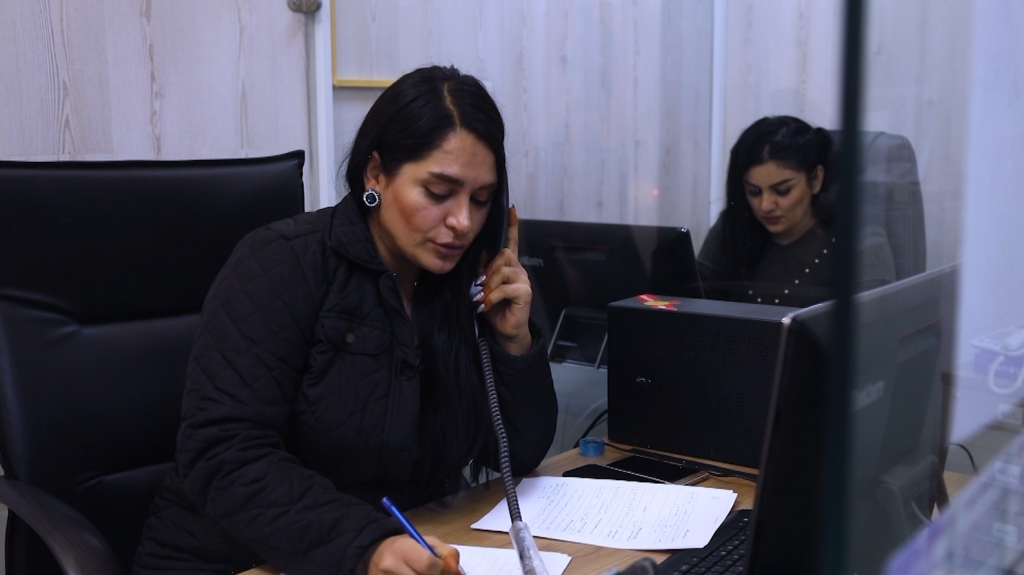
KHANZAD's Approach to Counselling
Protection and holistic counselling for women in violent situations
Many of the women who seek counselling are fleeing family violence, forced marriage, family sanctions following the discovery of a premarital or extramarital relationship and face existential threats: further violence, banishment by the family and honour killings. Protection and counselling are therefore inseparable; this requires close cooperation between civil society counselling centres and state contact points and shelters, the police and the judiciary. Through many years of experience, KHANZAD and local partners have developed a holistic counselling approach that combines legal advice and representation of women as well as psychological and social counselling with economic support, education, information and empowerment to develop new life perspectives.
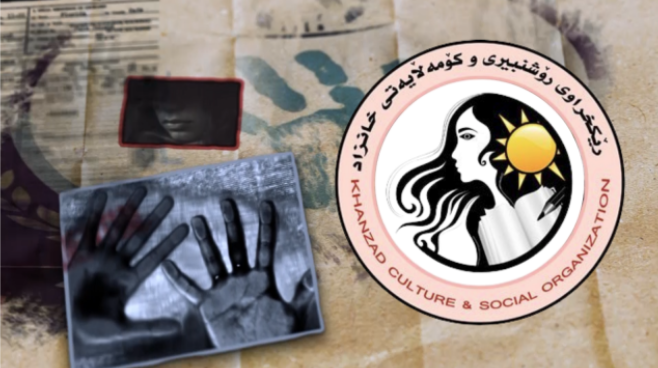
Family Mediation
Kurdish society is structured along family lines; women who flee their families or marriages cannot find a safe, anonymous place to live within the Kurdish region of Iraq. Women living alone are socially stigmatised; many women also cannot imagine a life outside their families. The return of the women concerned to their families and social contexts is therefore a central goal in most counselling processes. Together with the woman concerned, various options for action within and outside the family are initially worked out, from reporting and prosecuting perpetrators of violence to a negotiated solution with the family. The wishes and life plans of the woman concerned and, if applicable, the welfare of her children are decisive for the counselling strategy in each step. KHANZAD’s interdisciplinary colleagues (lawyers, social workers, educators), who are experienced in family mediation, analyse the family situation together with the woman concerned, identify potentially supportive relatives and other trusted persons in the family’s environment, e.g. teachers, village elders, religious authorities, and involve them in the counselling process. Legal and police pressure against family members who threaten the woman is combined with offers of dialogue. Many perpetrators are themselves under strong social pressure to defend their honour; the semi-public nature of the family conflict brought about by the intervention of KHANZAD and state partners offers them a socially accepted way out of the threatened violence without losing face. In negotiation processes that often last for months, solutions are negotiated that provide the victims with security and enable them to return to their social environment. Such a solution could be, for example, that a family threatening their daughter and her boyfriend with honour killing because of a premarital relationship is persuaded to negotiate a marriage between the two. Or a woman who has an extramarital relationship may negotiate a divorce from her husband and a return to her paternal family or marriage to her boyfriend without being sanctioned by the family. In follow-up visits that often last for years, KHANZAD checks whether solutions that have been negotiated actually hold.
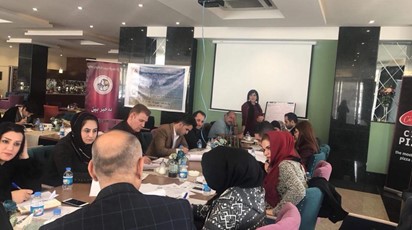
Training for Local Counsellors
Training courses organised by HAUKARI e.V. and KHANZAD for local professionals build on the contextualised approaches of local colleagues. Many training courses are organised with local trainers. However, qualification workshops run by international trainers also focus on contextualising international concepts of psychological and social work and strengthening and systematising local theoretical and practical approaches.
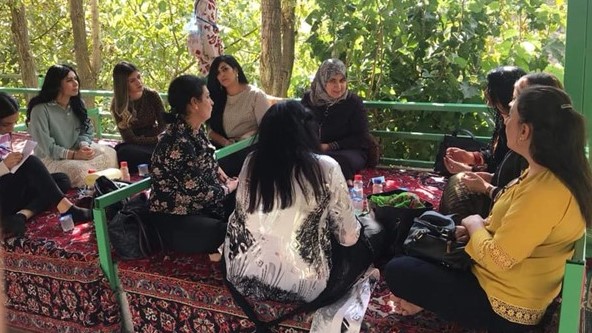
Supervision and Self-Care
The KHANZAD team and civil society and state partners are all working under great pressure. They are working in a context of crisis and violence in which not only their clients but also they themselves are living through stress, uncertainty and fear of the future. Many counsellors experience a lack of understanding and stigmatisation in their own environment due to their work in refugee camps and their dealings with women in social emergencies. In their counselling practice, they are also confronted with extreme experiences of violence, death threats and suicidal tendencies on a daily basis. Since 2016, all employees working in the projects supported by HAUKARI e.V. have received regular group supervision from local experts in psychology and the social sciences. We see supervision as a space for reflection in which case supervision, team coaching, relaxation/self-assurance and individual counselling are all possible. The supervisors share their experiences at regular specialist meetings.
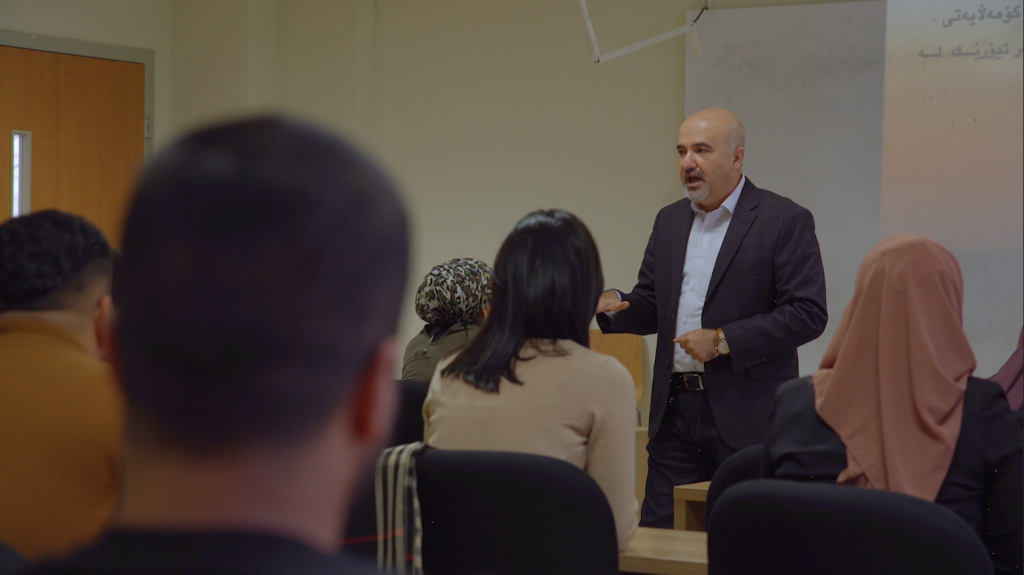
Cooperation with Local Universities - Theory-Practice Transfer
HAUKARI e.V. and KHANZAD work closely with local universities, in particular the Institute of Social Work at the University of Sulaimania and the Institute of Psychology at the University of Germian/Kalar. Professors and lecturers from both universities provide further training and supervision for project staff and take part in evaluations of the HAUKARI and KHANZAD projects.